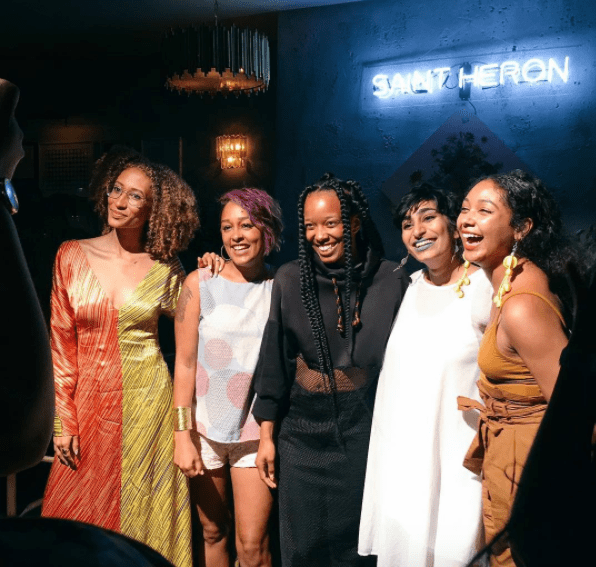“I pledge allegiance to the group text.” It’s a line from poet Safia Elhillo‘s first collection, The January Children, and it was a guiding principle of the Friday-night panel at which she talked, alongside four other artists, at a gathering assembled by Solange and Saint Heron. After some light cocktail-hour dancing to TLC and Biggie at the Soho House in Chicago, the women sat down to investigate the place where the artistic collides with the political. Safia was joined by musician Jamila Woods, writer Fatimah Asghar, and scholar Eve Ewing. The conversation was led by editor Elaine Welteroth. And as they told us, the group text made it possible. The four writers are in one together. It’s their solace, community, and joy. It’s a way of processing, collaborating, and creating.
Fatimah, a screenwriter and poet, gestured to the women next to her, “Whenever I am attacked, these are literally the people I text. When I get something really, really Islamophobic or something like, You can’t be Muslim and queer at the same time, this is who I text. These are the people that make me feel like I can be a human and walk through the world.”
It’s an allegiance that shines a different light on what loyalty can mean. When she woke up after the election, Safia said she thought about where “I look to for community instead of countries, the things I feel patriotism to, and the things I feel nationalism for. And I feel nationalism for the group text, for this group of people I’m sitting amongst. That’s what doesn’t fail me when the nationalistic experience continues to.”
Singer and writer Jamila Woods said that when she was stuck on her album, she turned to this phone tree. “It’s also for emotional support; it’s also part of my process in a way that helps feed it,” she explained. She reached out to Eve, sitting close by, and others to answer questions via voicemail, and used these messages to string together her songs. “I literally couldn’t finish it without this community of people,” she said.
Before Jamila’s Pitchfork show on Sunday, Safia and I found some shade to talk about the energy of collaborative friendships. She mentioned that she started many of her poems because she thought they would be funny. It was through sharing them with her artistic confidantes that she saw that her poems had a deep heaviness. “I’m a young-as-hell writer, but when I was even younger as hell, I thought I had to perform seriousness because I thought that was what poetry was. Now, it’s the opposite. I think my poems are funny, even though I know they’re objectively not. They’re an inside joke with myself.”
In their work, these four women often investigate the act of re-forming boundaries and connections. Safia’s poetry asks questions about countries and communities, and lavishes hope on the power of making new borders, especially when the ones that are formed around you are made unwelcoming, violent, or grotesque. She offers an incisive perspective: “I draw thick black lines around my eyes and they are a country, I draw thick red lines around my lips and they are a country… For every country I lost I make another.” There is joy in personal line-drawing, and power in making light of something serious.
Safia introduced herself in a similar way on Friday. “I’m a writer, educator, eyeliner-drawer, Sagittarius,” she said. The group of friends all took it on themselves to talk about each other’s awards and accomplishments (there are many). “We need to decolonize the bio,” Safia suggested, adjusting her seat on the coat she was sitting on by the stage. “It’s much more fun to talk up your friends.”
Ewing, the scholar and voicemail-leaver, said that a rigorous critique is an important part of their communication. This is part of a project that sees friendships as the new canon. Eve said, “For a lot of the work we’re trying to do, the canonical models are unclear. All of us have gone to school in situations where we see a canon that doesn’t reflect the work we’re trying to do. So we look to each other.”
Credits
Text Maggie Lange
